Top History Books
12 min read ⌚
“Those who cannot learn from history,” wrote Madrid-born American philosopher George Santayana, “are doomed to repeat it”. Unfortunately, the fact that history does repeat itself – as Marx wrote, “the first time as tragedy, the second time as farce” – shows that we haven’t really heeded to Santayana’s words.
Or, to quote a famous quip by George Bernard Shaw: “We learn from history that we learn nothing from history.”
So, maybe, it’s time to change that. And what better way to do this, but by leafing through few of the best history books ever written.
Some are here for their historical value, others for the in-depth analysis of specific time periods or historical figures. Most, however (about a third) are extensive overviews of human history, from the beginning of time until today.
And are both funnier and more educational than you’d expect or even wish for! The best history books are all yours!
#1. “Histories” by Herodotus
 They don’t call you “The Father of History” for nothing, do they?
They don’t call you “The Father of History” for nothing, do they?
Born sometime around 484 in Halicarnassus (then part of the Persian Empire) – as far as we know – Herodotus was the first man in history to have shown an interest for what we would now refer to as historiography. Namely, he didn’t merely want to learn and retell the stories of yore; he wanted to fact-check them as well.
And the result is “The Histories,” his only book and the first historiographical work in all of Western literature. At times both biased and over-the-top fantastical, it is nevertheless even more reliable than you’d expect.
Primarily focusing on the rise of the Persian Empire, and the origins of the Greco-Persian wars, “The Histories” is, far and above, the most important source on these matters. And both the general public and historians enjoy it and quote it two and a half millennia after its appearance.
#2. “History of the Peloponnesian War” by Thucydides
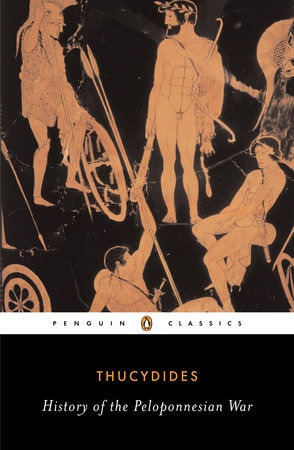 Herodotus died about six years after the Ancient Greek world started a devastating quarter-of-a-century long war, which signaled not only an internal shift in power but also the end of Greece’s golden age.
Herodotus died about six years after the Ancient Greek world started a devastating quarter-of-a-century long war, which signaled not only an internal shift in power but also the end of Greece’s golden age.
We’re, of course, talking about the Peloponnesian War, fought between the Athens-led Delos league and the Peloponnesian League led by Sparta.
Most of the things you know about it come from an Ancient Athenian, named Thucydides, whose book, “History of the Peloponnesian War” is widely credited as the first scientific work of history.
You see, Thucydides wanted to be better than Herodotus in describing the historical events he personally witnessed and experienced, so he further developed the quite recent historical method. His rules: impartiality and evidence-based cause-and-effect analysis, free from any reference to divine interventions.
Because, as he was aware, his work was “not a piece of writing designed to meet the taste of an immediate public, but was done to last forever.”
2,500 years later, we can only admire his farsightedness.
#3. “Alexander the Great” by Philip Freeman
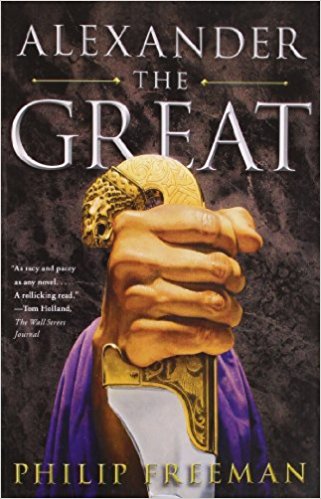 The Peloponnesian War brought about the economic collapse of the Ancient Greek city-states. The loser, Athens, was merely a shadow of its former glory, and the winner, Sparta, spent decades fighting with poverty and hunger.
The Peloponnesian War brought about the economic collapse of the Ancient Greek city-states. The loser, Athens, was merely a shadow of its former glory, and the winner, Sparta, spent decades fighting with poverty and hunger.
And, as they say, “when two people quarrel, a third rejoices.”
In this case, the third was the small kingdom of Macedon, which in less than half a century, would grow to become one of the largest empires in history, almost exclusively owing to two remarkable monarchs, Philip II of Macedon and Alexander the Great.
Philip Freeman’s “Alexander the Great” is considered to be “the first authoritative biography of Alexander the Great written for a general audience.” A comprehensive introduction to his life and accomplishments, the book follows the rise and rise of the Macedonian king from its very beginning in Macedonia to his final demise at the ends of the earth.
And, for the absolute novices – it even includes an excellent little glossary at the end!
#4. “The History of the Decline and Fall of the Roman Empire” by Edward Gibbon
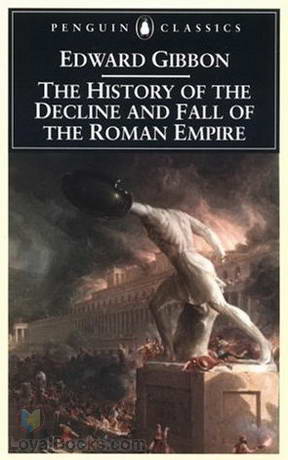 Alexander’s empire was torn apart soon after his death. His descendants learned nothing from history. And, once again, the quarrel of many meant the blessing of one: Ancient Rome.
Alexander’s empire was torn apart soon after his death. His descendants learned nothing from history. And, once again, the quarrel of many meant the blessing of one: Ancient Rome.
Obviously, you’ll easily find thousands of great books and movies about the glorious Roman years of Caesar and Augustus. However, not many focus on the decline of the Roman Empire.
And, by popular acclaim, none of them matches Edward Gibbon’s “The History of the Decline and Fall of the Roman Empire,” a six-volume masterpiece which deservedly won Gibbon the name “the first modern historian of ancient Rome.”
Gigantic in both length and scope – it covers the period from 98 to 1590 – “The History of the Decline and Fall of the Roman Empire” became a model for later historians, both because of its heavy use of primary sources, and its secularizing tendency and tone.
Its enjoyably ironic and sumptuously aphoristic style has been unsurpassed to this day.
#5. “Muqaddimah: An Introduction to History” by Ibn Khaldun
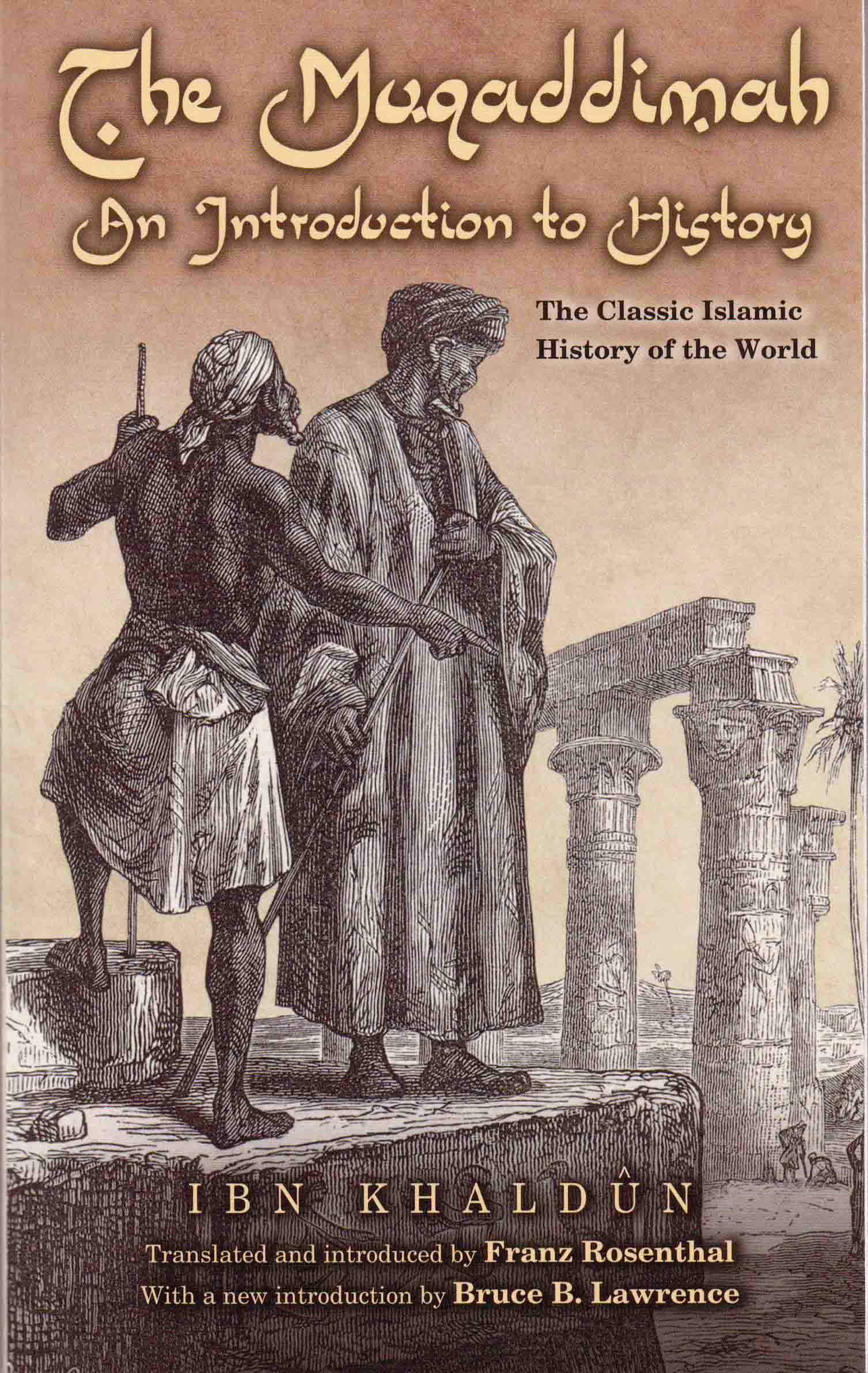 Unfortunately, more often than not, we tend to forget that civilization is not a Western phenomenon. And that, in fact, some of civilization’s most significant achievements have been made by people whose names you’ve probably never even heard of.
Unfortunately, more often than not, we tend to forget that civilization is not a Western phenomenon. And that, in fact, some of civilization’s most significant achievements have been made by people whose names you’ve probably never even heard of.
Arab historian Ibn Khaldun is one of these people. One of the most influential philosophers of the Middle Ages, his “Muqaddimah” (westernized as Ibn Khaldun’s “Prolegomena”) is such an important work that he deserves his place among history’s greatest solely on its merits.
Written in 1377, the book is the first known attempt by any human at writing a universal history. It’s also the first… On second thought, let’s look at Wikipedia’s description for a whole list of firsts.
Namely, Ibn Khaldun’s “Muqaddimah” is considered by some to be the first work dealing with the philosophy of history or the history of social sciences. It’s certainly the first to touch upon concepts such as demography, cultural history, economics, and even social Darwinism! Moreover, it’s also the first to take ecology and political history seriously.
Already quite a lot of reasons to read this book, right?
#6. “The Rise and Fall of the Third Reich: A History of Nazi Germany” by William L. Shirer
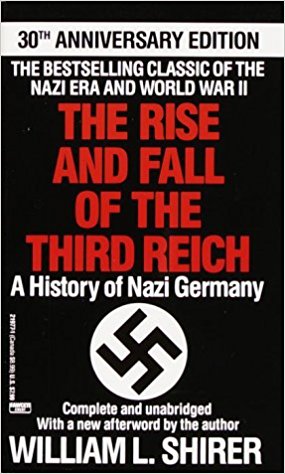 William L. Shirer was originally a foreign correspondent for “Chicago Tribune,” before he became famous for his Berlin broadcasts for CBS. However, this fame would prove nothing compared to the one he’d earn after Simon & Schuster published his bestselling account of Nazi Germany, “The Rise and Fall of the Third Reich.”
William L. Shirer was originally a foreign correspondent for “Chicago Tribune,” before he became famous for his Berlin broadcasts for CBS. However, this fame would prove nothing compared to the one he’d earn after Simon & Schuster published his bestselling account of Nazi Germany, “The Rise and Fall of the Third Reich.”
Hailed by “The New York Times” as “one of the most important works of history of our time,” “The Rise and Fall of the Third Reich” is an extensive (more than 1,200 pages) history of modern Germany. And it chronicles the years between the birth of Adolf Hitler and the end of World War II (1889-1945).
Based on his personal memories, the Nuremberg trials and British Foreign Office reports, captured Nazi documents and the diaries of Joseph Goebbels, Franz Halder, and Galeazzo Ciano, “The Rise and Fall of the Third Reich” is the most popular history of one of the most notorious regimes in human history.
#7. “The Age of Extremes: The Short Twentieth Century, 1914–1991” by Eric Hobsbawm
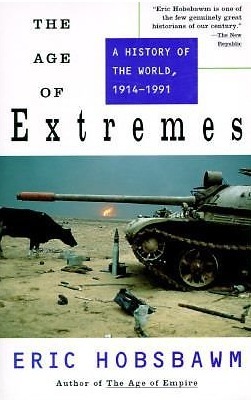 British historian Eric Hobsbawm is widely considered to have been one of the greatest historians of the last two centuries. So much so, in fact, that his terse descriptions of both have become a staple in historiography: “the long 19th” and “the short 20th century.”
British historian Eric Hobsbawm is widely considered to have been one of the greatest historians of the last two centuries. So much so, in fact, that his terse descriptions of both have become a staple in historiography: “the long 19th” and “the short 20th century.”
For our list, we opted for his book on the latter, “The Age of Extremes,” even though his trilogy about the former is equally lauded and respected. (Check it out! It consists of “The Age of Revolution: Europe 1789–1848”, “The Age of Capital: 1848–1875” and “The Age of Empire: 1875–1914.”)
“The Age of Extremes” is a largely pessimistic historiographical work, detailing, in about 640 pages, the failures of capitalism, nationalism, and state socialism.
It’s also a scathing critique of post-war art, described by Hobsbawm as “a succession of manifestos of despair,” and a constant reminder that “If humanity is to have a recognizable future, it cannot be by prolonging the past or the present.”
And yet, even quarter of a century after its first publication, nothing has changed.
#8. “The Innovators: How a Group of Hackers, Geniuses, and Geeks Created the Digital Revolution” by Walter Isaacson
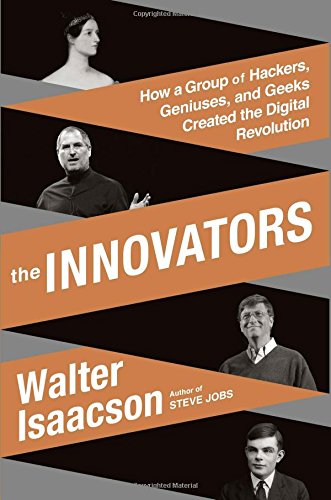 And now we move from the depths of the despair to the heights of hope!
And now we move from the depths of the despair to the heights of hope!
“The Innovators” by Walter Isaacson features a decisively different tone, one that’s filled both with optimism and wonder at the mental capabilities of humans.
And how can it be any different?
The book is “a riveting, propulsive, and at times deeply moving” story of a host of figures who contributed to you being able to read this in your home, on a PC, via the Internet.
A more than a fascinating study of human progress and collaboration, “The Innovators” is divided into twelve chapters, ten of which cover different aspects of the digital revolution, framed by two dedicated to Ada Lovelace, the forgotten pioneer, the first computer programmer.
The main takeout: if politicians don’t want to learn from history, scientists may as well do. And, after all, they are our best shot at a more beautiful and humane future.
#9. “A People’s History of the United States” by Howard Zinn
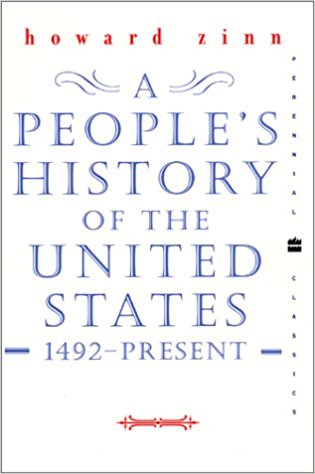 If you’re living in the United States, the chances are you already own this book. But, let’s face it, you knew this book would show up somewhere down this list, didn’t you?
If you’re living in the United States, the chances are you already own this book. But, let’s face it, you knew this book would show up somewhere down this list, didn’t you?
A professor and a political scientist, a playwright and a social activist, Howard Zinn was, most of all, a historian writing with the voice – and in the name – of those who don’t get to write their histories. The small people, the marginalized ones.
You see, most historiographers (especially conservative ones) will tell you that “the history of the world is but the biography of great men” (Carlyle). Zinn would beg to differ. His history is the history of the factory workers, of the unfairly treated immigrants, of the working poor, of the African Americans.
Or, as he puts it himself, a history of “a striving, against corporate robber barons and war makers, to make [the American ideals] a reality.”
Like this summary? We’d like to invite you to download our free 12 min app, for more amazing summaries and audiobooks.
#10. “Guns, Germs, and Steel: The Fates of Human Societies” by Jared Diamond
 Jared Diamond is one of the last great polymaths and one of the most revered intellectuals of our age.
Jared Diamond is one of the last great polymaths and one of the most revered intellectuals of our age.
And, just as you would expect, his 1997 study “Guns, Germs, and Steel” is not merely historiographical, but as transdisciplinary as possible. Its original subtitle, as pretentious as it may seem, describes it best: “A Short History of Everybody for the Last 13,000 Years.”
And Diamond delivers on the promise big time!
The main idea of the poetically titled “Guns, Germs, and Steel” is relatively simple. Namely to prove that Eurasian hegemony is not due to some inherent intellectual or biological advantages of Eurasians, but due to thousands of environmental and geographical circumstances, some of which can easily be deduced.
And the best thing is that not many people other than Diamond are able to argument such a thesis. Because, you see, when we said polymath at the beginning, we meant geographer, biologist, ecologist, and anthropologist.
And “Guns, Germs, and Steel” employs all of these sciences to tell of a pretty different history.
#11. “Sapiens: A Brief History of Humankind” by Yuval Noah Harari
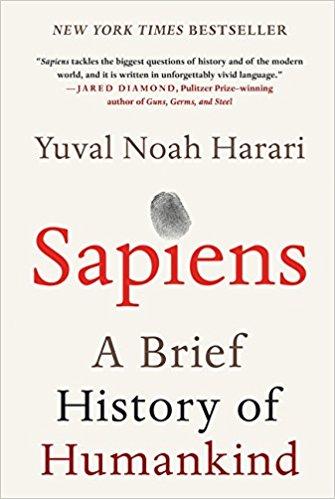 “Sapiens” wouldn’t have existed if it wasn’t for “Guns, Germs, and Steel.”
“Sapiens” wouldn’t have existed if it wasn’t for “Guns, Germs, and Steel.”
In fact, Yuval Noah Harari, a modern Israeli historian, explicitly states that Jared Diamond’s masterpiece was by far the most profound inspiration on his book because it showed him that it was possible to “ask very big questions and answer them scientifically.”
So, he did pretty much the same in “Sapiens,” combining biology and history to rewrite the narrative of the most resilient human species, the homo sapiens.
Even though the book starts some 70,000 years ago with the Cognitive Revolution, Harari doesn’t forget to remind its readers that homo sapiens was only one of six different human species. In the second part of the book, he goes on describing the takeaways from the Agricultural Revolution, before breaking down the reasons for the Unification of Humankind and the history of the Scientific Revolution.
The book ends with a blood-curdling stream of visions of man’s future, the topic of Harari’s most recent book, “Homo Deus.”
#12. “A Short History of Nearly Everything” by Bill Bryson
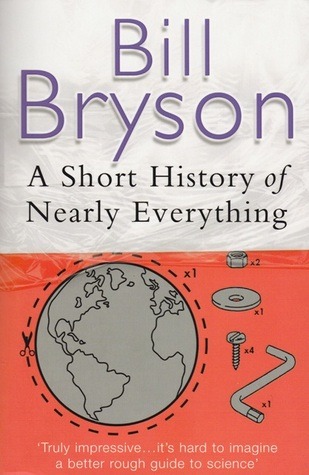 Have you ever felt like your high school science textbooks were mind-numbing and boring to death? Sure, you could blame it on your lack of interest for science – after all, you didn’t care for either protons or Napoleon. That is if you’re not beloved British writer Bill Bryson.
Have you ever felt like your high school science textbooks were mind-numbing and boring to death? Sure, you could blame it on your lack of interest for science – after all, you didn’t care for either protons or Napoleon. That is if you’re not beloved British writer Bill Bryson.
You see, by his own admission, before embarking on the beautiful journey that is “A Short History of Nearly Everything,” Bryson knew almost nothing about the universe and its history.
However, he was reasonably sure that there was nothing wrong with him. Science was great; to understand our history through it – even better. It was the textbooks: they weren’t fun enough, and they weren’t passionate – at all.
And that’s where “A Short History of Nearly Everything” comes in. It details everything from the Big Bang to the advent of civilization in an engaging, humorous, and layman language. You’ll feel ten times smarter after finishing this book.
And you’ll finish it in the blink of an eye!
#13. “The Evolution of Everything: How Small Things Transform the World” by Matt Ridley
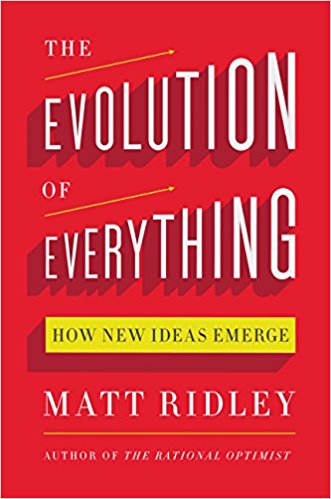 In a letter sent to an Anglican bishop, Lord Acton wrote two sentences which are as widely misattributed as they are ignored: “Power tends to corrupt, and absolute power corrupts absolutely. Great men are almost always bad men…”
In a letter sent to an Anglican bishop, Lord Acton wrote two sentences which are as widely misattributed as they are ignored: “Power tends to corrupt, and absolute power corrupts absolutely. Great men are almost always bad men…”
Just like Howard Zinn, Matt Ridley – a British biologist with a Ph.D. in zoology – doesn’t believe in history being a string of biographies of the great men. But, he’s even more radical than Zinn. In his opinion, history (and, precisely, progress) is just something that happens!
And “The Evolution of Everything” is his attempt to test out his idea in sixteen different areas, ranging from physics and biology, through the economy and the education to the government and interpersonal moral.
It’s a book of fascinating breadth and depth. And even more interesting conclusions. Like, for example, the one that even though Einstein was a great guy, the theory of relativity would have been conceptualized even if he hadn’t existed; by, say, a certain Hendrik Lorentz.
Why? Well, because 23 different people invented the light bulb around the same time.
Just read the book. You’ll see what we’re talking about.
#14. “A History of the World in 6 Glasses: How Your Favorite Drinks Changed the World” by Tom Standage
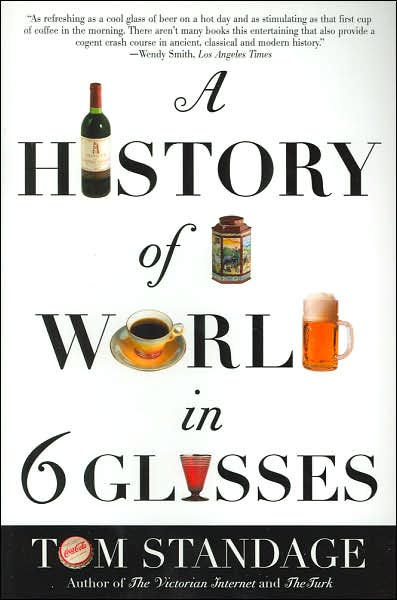 You can split up the history of the world in periods or chapters – but in 6 glasses? Now, how would that look like? The simple answer is: as exciting as you would hope for and much more thorough than you would expect.
You can split up the history of the world in periods or chapters – but in 6 glasses? Now, how would that look like? The simple answer is: as exciting as you would hope for and much more thorough than you would expect.
Tom Standage’s “A History of the World in 6 Glasses,” tells the story of the world – from the Stone Age to the 21st century – by carefully examining the history of six different beverages: beer, wine, spirits, coffee, tea, and cola. And the results are as magnificent as unexpected!
For example, beer contributed to the creation of civilization; so much so, in fact, that it’s described in the world’s oldest literary work “Gilgamesh” as “the drink of the civilized man.” Wine, on the other hand, was how the Greek cultural conquests came to be.
Spirits fueled the Age of Exploration, and the French Revolution started in a coffeehouse. Sandwich “tea” between “Boston” and “party” and you immediately get its significance.
And is there a better way to describe globalization than “Coca-Cola”?
#15. “The Geography of Genius: A Search for the World’s Most Creative Places from Ancient Athens to Silicon Valley” by Eric Weiner
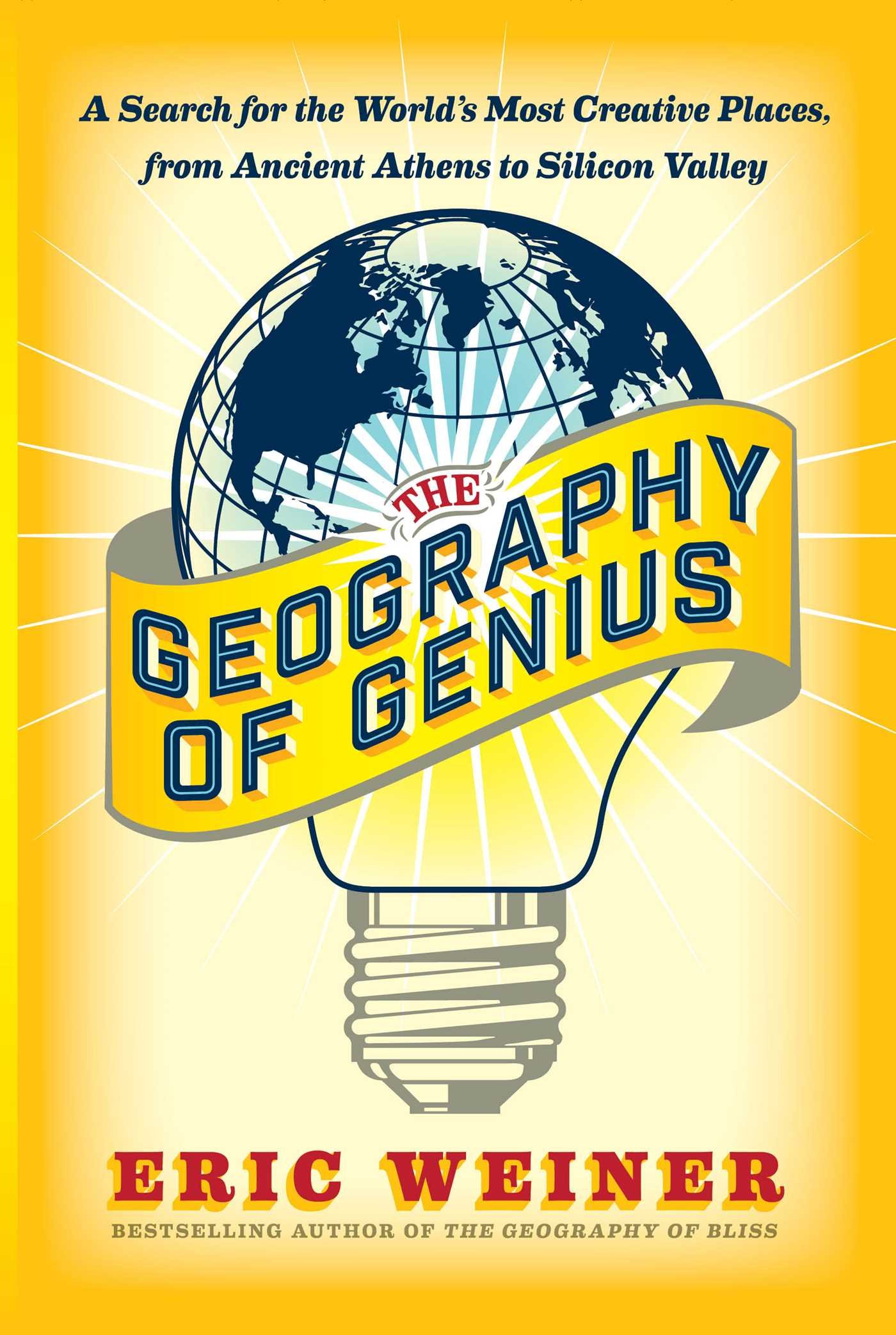 Even as a wildcard, it’s somewhat strange that one of our top 15 history books is titled “The Geography of Genius.” But, the title is as accurate as it is misleading. Even though “A History of the World in 8 Genius Clusters” might have made a lot more sense.
Even as a wildcard, it’s somewhat strange that one of our top 15 history books is titled “The Geography of Genius.” But, the title is as accurate as it is misleading. Even though “A History of the World in 8 Genius Clusters” might have made a lot more sense.
Because, that’s how you can best sum up “The Geography of Genius” in 10 words or less. In it, respected journalist Eric Weiner sets off on a journey both around the world and throughout history to discover why some places, at specific points of time, started begetting geniuses, seemingly at will and in multitudes.
The places? Ancient Athens, Song Dynasty Hangzhou, Renaissance Florence, 18th century Edinburgh, 19th century Calcutta, Vienna of the 1900s (twice), and the Silicon Valley of today.
Walter Isaacson – see #8 above – describes this book most accurately when he says that it is “a charming mix of history and wisdom cloaked as a rollicking travelogue filled with colorful characters.” And Dan Gilbert, though not as stylish, is as truthful: “an intellectual odyssey, a traveler’s diary, and a comic novel all rolled into one. Smart, original, and utterly delightful.”
Now, dare we say: “genius”?
Emir is the Head of Marketing at 12min. In his spare time, he loves to meditate and play soccer.







